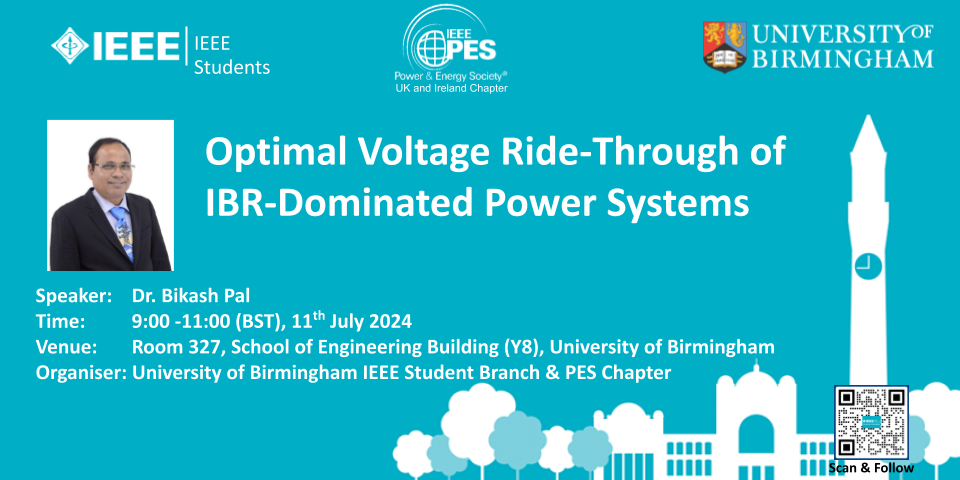Optimal Voltage Ride-Through of IBR-Dominated Power Systems
Abstract:
With the increasing penetration of inverter-based resources (IBRs), disconnecting IBRs from the system “at first sign of trouble” could exacerbate system instability under large voltage disturbances (sag, swell and unbalance). Several large blackouts or interruption events in relation to the improper operation of IBRs under voltage disturbances have been reported in recent years. Although a consensus has been reached that IBRs should be able to ride through various voltage disturbances while providing dynamic voltage support (DVS) to the grid, it is still not clear how to achieve the optimal DVS. This talk will share our recent research efforts in improving the DVS performance of IBRs under abnormal voltage conditions. Three critical questions are answered via optimisation. 1) What is the maximum DVS capability of a single IBR? 2) How to implement the maximum DVS without relying on the knowledge of grid model parameters? 3) How do multiple IBRs interact with each other in a network? The optimisation-based methodologies open up an effective way to explore sophisticated control strategies of IBRs under large disturbances, and the research findings complement and even challenge our physical intuition.
Speaker:
Bikash Pal is a Professor of Power Systems at Imperial College London (ICL). He is research active in power system stability, control, and estimation. Currently he is leading a six university UK-China research consortium on Resilient Operation of Sustainable Energy Systems (ROSES) as part of EPSRC-NSFC Programme on Sustainable Energy Supply. He led UK-China research consortium project on Power network stability with grid scale storage (2014-2017): His research is conducted in strategic partnership with ABB, SIEMENS, GE Grid Solutions, UK, and National Grid, UK. UK Power Networks. SIEMENS R&D collaborated with him to develop fast power flow and volt-var control tools in Spectrum Power, an advanced module for distribution management system solution from SIEMENS. This is now commissioned in distribution control centres in Columbia, Bosnia Norway and Azerbaijan serving 15 million customers in these countries. GE commissioned sequel of projects with him to analyse and solve wind farm HVDC grid interaction problems (2013-2019). Prof Pal was the chief technical consultant for a panel of experts appointed by the UNFCCC CDM (United Nations Framework Convention on Climate Change Clean Development Mechanism). He has offered trainings in Chile, Qatar, UAE, Malaysia and India in power system protections, stability and control topics. He has developed and validated a prize winning 68-bus power system model, which now forms a part of IEEE Benchmark Systems as a standard for researchers to validate their innovations in stability analysis and control design. He was the Editor-in-Chief of IEEE Transactions on Sustainable Energy (2012-2017) and Editor-in-Chief of IET Generation, Transmission and Distribution (2005-2012). He is Vice President, PES Publications (2019-2023). In 2016, his research team won the President’s outstanding research team award at Imperial College London (ICL). He is Fellow of IEEE for his contribution to power system stability and control. He is Fellow of The Royal Academy of engineering, UK for the impact of his contribution to the field. He is an IEEE Distinguished Lecturer in Power distribution system estimation and control. He has published about 125 papers in IEEE Transactions and authored four books in power system modelling, dynamics, estimations and control. He was Otto Monsted Professor at Denmark Technical University (DTU) (2019) and Mercator Professor sponsored by German Research Foundation (DFG) at University of Duisburg-Essen in 2011.
Date and Time
Location
Hosts
Registration
-
 Add Event to Calendar
Add Event to Calendar


